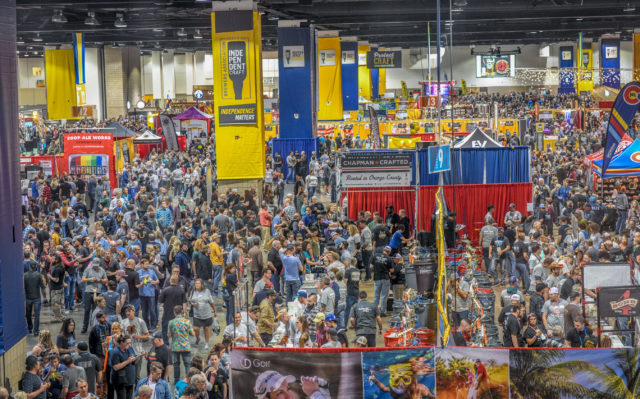
For those of you waiting for the other shoe to drop, it happened on May 20. When, “Governor Jared Polis issued an Executive Order temporarily suspending certain statutes to allow the operation of alternate care sites in Colorado because of the presence of COVID-19, rendering GABF at the Colorado Convention Center infeasible,” the Brewers Association (BA) said in a statement.
The BA — the Boulder-based trade organization representing small and independent breweries — hosts the Great American Beer Festival (GABF) every autumn in Denver. They are also the organization behind the annual Craft Brewers Conference (CBC), scheduled for San Antonio, Texas, this past April, and Savor, a food and beer festival held every May in Washington, D.C. Also based in Boulder and working closely with the BA, the American Homebrewers Association (AHA)’s annual Homebrew Con was scheduled for this June in Nashville, Tennessee. The last three were canceled almost immediately (two of them fell during the mid-March to mid-May coronavirus shutdown). Restrictions on travel and gatherings would have made Homebrew Con infeasible, but the BA was holding out hope that GABF could go on in some capacity in September. But when Polis had the Army Corps of Engineers convert the convention center into a pop-up treatment facility in early April, the future looked shaky. Now it appears that the Convention Center care facility will be with us for some time, and GABF will not.
Like CBC and Homebrew Con, GABF will pivot to a virtual festival (Oct. 16-17). Though it’s still in planning, the BA says it will include “beer tastings, conversations with brewers, local brewery activations, and at-home beer and food pairing deliveries.” The competition will also go on, with medals and fist bumps handed out from afar.
While canceling GABF isn’t good for the BA or for the 60,000-plus beer drinkers who flood the convention center each year, it’s worst for the brewers. The brewing industry, craft or not, relies heavily on the free transmission of ideas and innovation. And not just between pros, but between pros and amateurs. Pick up any copy of Zymurgy — published by the AHA — and you’ll find recipes from professional brewers and tips on how to make their iconic ales and lagers. Flip through a copy of The New Brewer — the publication of the BA — and industry vets are constantly giving tips on best practices for incoming brewers.
GABF concentrates these transactions. Brewers in Colorado discover beers from California and discuss techniques. A couple of beers between friends after the festival can turn mutual appreciation into collaboration. Maybe even a business venture. While social media has essentially allowed every local brewery to attract national attention, the proliferation of festivals, invitations and conferences have accelerated the growth of brewing in America. The beer a brewer drinks on Saturday can inspire what goes in the kettle on Monday.
Brewing is a lot of hard, lonely work. It’s scrubbing tanks and mashing in; washing kegs and pitching yeast; cleaning lines and canning beer. And if you’re a small brewery, chances are you do it solo. GABF allows these brewers to pop their heads up and see what else is going on. Talk to other brewers and glean a trick or two. Maybe even discover a new beer style. And that can happen virtually, but not at the intensity of walking the floor at GABF.
The unintended consequences of social distancing
As Toby Moskowitz, economics professor at Yale University, said on the Freakonomics podcast in March: “If everyone’s working from home, there’s not going to be that kind of workplace discussions, coffee-table discussions, lunchtime talk. And most of that, it turns out, is important for long-run innovation.”
Social distancing, working from home and Zoom meetings eliminates those moments of “idle time and relaxed discussions with colleagues.” Silicone Valley was built on this very concept: Give employees an all-inclusive place to work, eat and play, and they’ll spend more time at the office helping their colleagues solve problems from a more creative approach than if they were just punching a clock.
“That’s all gone,” Moskowitz said. “So I also worry that five, 10 years out from now, we will see this as another lowering in long-run growth rate because we’ve taken a big hit to innovation.”
Listen to Moskowitz’s discussion with Freakonomics host Stephen Dubner at freakonomics.com/podcast/covid-19-effects/.














